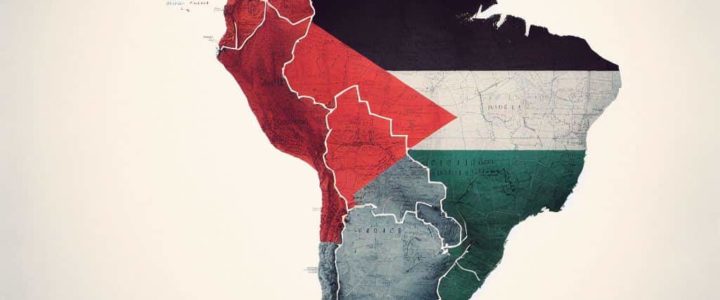With this story, we will have to start about sixteen years ago.
Scaremongering About Bolivia and Islam
CounterPunch
Devin Beaulieu
September 4, 2009Jose Brechner, who has warned of the dangers of Islamic radicalism in Bolivia even prior to Evo Morales’ election, is instructive on this point. Brechner is a Bolivian journalist and political commentator who writes for various Latin American news journals and magazines and was a founder of the rightwing Nationalist Democratic Action party, the now defunct political organization of former US backed Bolivian dictator Hugo Banzer. As in the March 2009 opinion “Bolivia, Israel, and the Muslims” , he describes the threat in unabashed xenophobic terms.
“There is fear in Bolivia, and a lot of it, because those who do not know the frantic Indians do not know terror. The closest to the Bolivian altiplano indigenous are the hordes of Muslim fanatics.
MY NOTE: Counterpunch is a leftist journal, and writes with a slant.
In reality, Hugo Banzer was more than a dictator, and Banzer was democratically elected to his last term of office.
While José Brechner is right wing, there is no indication that José Brechner is anti-democratic. Rather his history is one of commitment to democracy. But, he does not mince words about the semi-anarchial state of Bolivian politics, where pre-Christian practices still linger among the indigenous population, which constitutes a massive demographic among the electorate. The problem is not their race, but their practices.
Finally, the Nationalist Democratic Action was split into competing factions, with Brechner in the more democratic wing.
Here is the article by José Brechner, which was cited by CounterPunch: Bolivia, Israel, and the Muslims. What Brechner was afraid of is that Islam might make inroads with the indigenous population. He claimed the indigenous were naïve, that they might fall for Islam.
He obviously considered some of the native peoples to be uncivilized, savage, and a fertile ground for Islamic indoctrination. Essentially, he was afraid that the Bolivian Indians might be induced to go on the warpath, or in this case: jihad.
Definitely, not woke; but was he right?
Bolivia, Israel, and the Muslims
Bolivia, Israel, and the Muslims
José Brechner “Corrección Política Cero”
Jose Brechner
February 3, 2009November last, [Evo Morales’] closest and most loyal followers, the bloodthirsty indians from Achacachi—a town close to La Paz–, after brutally beating up a group of 11 men and women between the ages of 40 and 60 that were visiting the place, were burnt alive until nine of them died. They accused them of theft, but they did not prove their crime.
…
Muslims want to settle in South America, and there is no better place than Bolivia to start the Islamic indoctrination, where they enjoy a numerous, naïve indigenous population, with no religious conviction.
Fox News also picked up the story.
Source: Bolivia Becoming a Hotbed of Islamic Extremism, Report Concludes (2009)
Fox News
Nora Zimmett
Updated: May 16, 2015One Muslim leader named in the OSC report is Mahmud Amer Abusharar, founder of the Centro Islamico Boliviano (CIB) in Santa Cruz. Abusharar emigrated from the Palestinian territories in 1974 and claims to have built Bolivia’s first mosque in 1994 so that he would not lose touch with his religion.
MY NOTE: Wikipedia had once reported that imam Abusharar died in 2011, but the citation was removed.
Yet, at the time of this post (2025), Wikipedia claims that Bolivia has only 2000 Muslims, less than .017% of the population.
This does not sound like a cause for panic.
Was it all smoke and mirrors … much ado about nothing?
José Brechner is Jewish, the Bolivian-born son of Holocaust survivors. Was he allowing his Jewish, and Zionist, sympathies to overwhelm his judgment?
Well, not exactly. As noted, on this website, and elsewhere (the ADL), Iran actively seeks to propagandize South America, with the help of Venezuela.
And then came this stunner, in 2023.
IRAN-BOLIVIA MILITARY COOPERATION: WHAT DOES IT MEAN FOR THE SECURITY OF THE REGION?
Instituto Analisi Relazioni Internazionali (IARI)
Daniel Andrés Birchner
August 10, 2023On July 20, the Defense Ministers of Iran and Bolivia (Brigadier General Mohammed Reza Ashtiani and Edmundo Novillo Aguilar, respectively) signed a Defense Agreement, in which Tehran commits to the sale of various military systems to La Paz. The intention declared by the Andean country consists of reinforcing its surveillance power on the borders, specifically north and south, where a large part of drug trafficking circulates. However, several states in the region expressed their disagreement with the treaty, alleging that it implies a possible threat to security.
Bolivia is one of the poorest nations in the Western Hemisphere, and it is landlocked. Why in the world would Iran even consider a military deal with it, unless Islamic infiltration were in mind.
It is starting to look like José Brechner might have been prescient after all.
Bolivia was steered to the left by Evo Marales, a socialist leader; and while Morales is out of power, and has just been indicted, the socialists still control politics in Bolivia.
However, even though Israel has given the Iranians a beating in 2024, the ayatollahs’ rule over Iran is still not finished, yet. And caution is in order, not only in the Mideast, but in Latin America.
José Brechner was right all along.
An even more fundamental question is why Islam and socialism partner so well.




